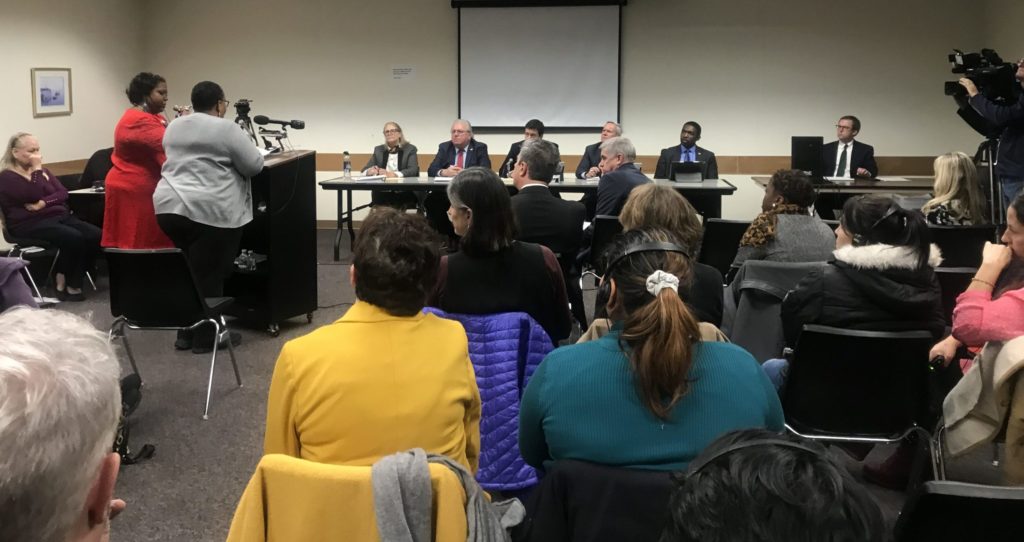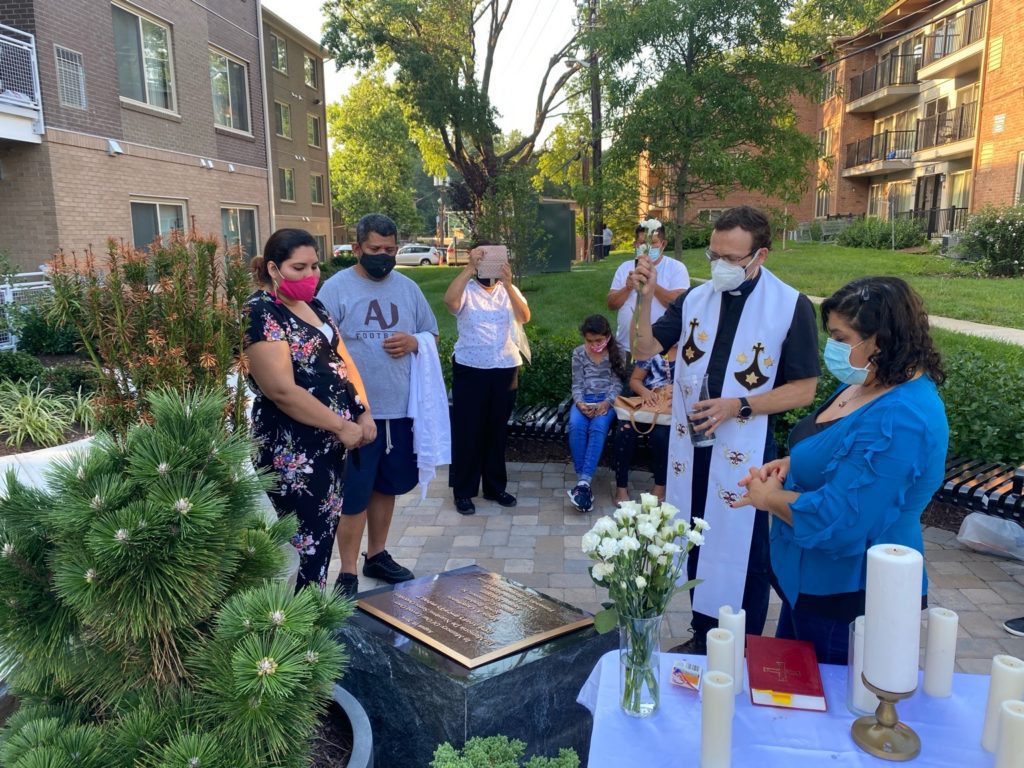UNITED IN CRISIS
In Our Own Power
United in Crisis
Standing in Our Own Power
In any other year, the victories we won at the local, state, and federal levels would be headline grabbing by themselves.
While larger catastrophes stole the headlines, 2020 was a still a year of major victories and tremendous progress for CASA members and the broader movement. Whether it was winning key policy battles after long struggles for justice, or bringing together millions to raise their voices and defend our democracy, the tenacity, courage, and dedication of our members was rewarded in 2020 by victory on a number of fronts.
Victory Lap
CASA's Key 2020 Victories, by State
Virginia
- An increase of the state minimum wage that puts Virginians on a path to get to $15 an hour
- Passage of driver’s privilege cards for immigrants
- In-state tuition for immigrant youth
- A dramatic increase in state support for educational programming for English Learners.
These were hard-won victories but they were not unqualified victories and left much work to do: driver’s privilege cards are not full driver’s licenses, the minimum wage increase is not guaranteed to reach $15/hour, and on our 5th policy goal of statewide universal legal representation for those facing immigration court – an extension of a successful pilot program in Fairfax County – we were unable to move the state legislature to action. With the legislative session in 2020 being impacted by COVID-19, we have continued to organize and fight around these issues with an eye towards victory in the coming months.
Only a short month later, in neighboring Fairfax County, CASA members achieved a similar victory when new police policy guidelines were released that barred police officers from cooperating with ICE or from enforcing immigration law. While this is not an official act of law, it is a critical step towards a full TRUST act in the county and rewards many months of organizing and advocacy with the county council.
Maryland
CASA made significant progress in advancing several immigrant rights priorities during the truncated 2020 legislation before it was prematurely ended due to the pandemic. We successfully overrode the governor’s veto of the Maryland DREAM Act expansion legislation in the first weeks of session, and had significant momentum toward passage of three critical immigrant priority bills: 1) the Dignity Not Detention bill, which would have prohibited any new or renewal contracts between local detention centers and ICE, as well as outlawing private ICE detention facilities in the state; 2) statewide TRUST legislation limiting collaboration between state and local law enforcement and correctional facilities and ICE; and 3) additional legislation limiting ICE access to MVA database information for the purpose of civil immigration enforcement. Finally, we made significant progress toward establishing a statewide legal defense universal representation fund through the general assembly budget process. In addition to these immigrant-specific priorities, CASA played a significant role in the Kirwan Commission advocacy effort toward equitable school funding, including leading the work around equitable funding for schools with higher ESL students and parent populations, which ultimately was passed by the legislature and vetoed by the governor.
Howard County Trust Agreement
CASA’s campaign in Howard County has intensified, including both a call to immediately cancel the IGSA (intergovernmental service agreement) contract with ICE but also to implement TRUST policy language to further limit local collaboration with ICE. CASA launched the Howard County Coalition for Immigrant Justice in September 2019 and has gradually grown the coalition as well as the grassroots pressure on both council members and County Executive Ball to take action. As a result, we have passed Trust Act legislation in December 2020 that has since been signed by the county executive. We also were able to tighten the IGSA to only allow people to be detained who have been convicted of violent crimes (as defined under Maryland State law).
Closure, Healing, and Moving Forward Together at Flower Branch
In August of 2016, when a gas explosion at Flower Branch apartments took the lives of five adults and two children and injured 60 more, a great many CASA members and immigrants were among those impacted by this horrific event. What followed, beyond the pain of loss and the difficulty and uncertainty about what to do and where to go for so many families, was a long and difficult legal battle. It wasn’t only about getting justice for the victims of this tragedy but also about preventing future families from ever having to deal with such a horrific situation again.
In December of 2019, with the legal battle with Washington Gas still ongoing, CASA members spoke in front of the Maryland Public Service Commission regarding gas safety concerns in the state. This was an important step as we continue to fight for housing rights and ensure that a Flower Branch incident doesn’t happen again. Many CASA members who weren’t directly affected came out as well to stand in solidarity, showing a united front as tenants. They made the message clear that we stick together!

In August of 2020, families gathered in solidarity and remembrance for the four year anniversary of this horrific event to honor those we lost. While this annual gathering has become a difficult but inescapable time to reflect on that 2016 horror, this was the first such gathering since the settlement had been reached. It is our hope that this legal victory will do some part to lessen the sting of this loss and this horrible anniversary for the families who have lost so much.

Pennsylvania
One of CASA’s first steps into Pennsylvania was to begin organizing with the immigrant and Latino communities in the South Central region of the state, and for our first years in the Commonwealth, that 3-county region of Lancaster, York, and Dauphin counties comprised CASA’s “turf” in the state. Over the last 12 months, CASA has worked hard to expand that turf by recruiting and organizing new members throughout the region.
We are proud to now have expanded our 3-county “core turf” region into seven counties in South Central Pennsylvania, from our historic core of York, Lancaster, and Dauphin Counties to the Philadelphia “collar counties” of Montgomery, Delaware, and Chester, as well as Lebanon County.
Part of this expansion occurred organically – CASA has always gone where our members are in order to best serve our community, and just like folks coming across the Potomac into Maryland from Virginia to our workers centers, or folks coming down from Pennsylvania to our Baltimore center into CASA centers to organize within us, so too did CASA’s work attract hundreds of new members from across the region. As our membership grew in new areas and we crossed the all-important 30-member threshold needed to establish a geographic member committee, CASA increased our capacity to be sure that we had the organizers and the resources to staff these new groups.
But new growth and membership didn’t just come from recruiting the folks that came to us – we also came to them! As already mentioned elsewhere in this report, the 2020 Census was a massive part of our work during this year, and CASA census outreach teams were constantly recruiting new members as they spoke to families about the census. Even after COVID-19 began and the census canvass had to pivot to a remote outreach program, tens of thousands of “warm contacts” had shown interest in CASA membership after that canvass and many hundreds ultimately joined the organization as sustaining members!
In 2021, CASA will continue to expand, seeking to upgrade our facilities in Pennsylvania, and looking to more rural areas to the west of our turf (Franklin, Cumberland, and Adams Counties).
2020 Elections
Getting Out The Immigrant Vote!
Since 2016, our members have felt the brunt of attacks on immigrant communities, withholding of critical aid to Puerto Rico, denial of vital COVID relief funding to some of the most vulnerable communities, and repeated and purposeful efforts to undercount, underserve, and otherwise dampen the power of our communities. Despite these circumstances, throughout the 2020 election cycle, our members organized. They reached out to their friends, family, and neighbors in person, by phone, whatsapp, and on Zoom. Thanks to their efforts, Latino communities showed up on Election Day – voting in record numbers despite the obstacles deliberately laid in front of them.
At CASA, the work leading up to Election Day began a full year prior with the launch of our census program. By the time the census campaign wound down in May of 2020, this team of amazing member leaders, from first generation Latino college students to Puerto Rican grandmothers, were ready to pivot into engaging potential voters in conversations about the upcoming elections.
Our Work
CASA applied this multilayered tactical approach, combining phone, text, field, relational, and digital tactics, to six key phases within the campaign:
Voter Education
Focusing on education about how elections work in the US and education about the changes to election processes.
Voter Registration
CASA utilized phone, text, and digital outreach to emphasize to our community the importance of voting and to help them through the registration process.
Vote by Mail
CASA was dedicated to helping our community take full advantage of vote by mail possibilities in Virginia and Pennsylvania, and deployed digital messaging to help counter misinformation about the safety and efficacy of voting by mail.
GOTV
Whether by-mail or in person, CASA did the work to ensure folks turned in their ballots, got to the polls and had their votes counted.
Voter Protection
Voter protection included working with local election commissions and the state authorities to try to get as many dropbox locations as possible, ensuring that information on voting by mail was clear and reflected the reality on the ground vis a vis USPS and state elections authorities, polling place watchdog work for intimidation and irregularities, and post election review for voting irregularities.
Election Day
On Election Day itself, CASA mobilized 486 voter guardians. Voter guardians were trained not only in the basics of voting rights and poll monitoring but also in de-escalation tactics and strategies for identifying and de escalating potential voter intimidation.
Post Election Protection
CASA’s voter protection work continued after Election Day as we immediately launched efforts to ensure that every vote was counted.
CASA Voter Engagement
Program Snapshot
Direct outreach to
an additional
Engaged
action additional
Recruited over
Election Day
Where we worked
In Pennsylvania, our virtual phone and text programs targeted Latino voters in 10 counties, in conjunction with the statewide coordinated campaign with Keystone Votes and statewide partners. Our field voter registration, GOTV, and election day programs focused on Latino voters in our core five counties of Chester, Montgomery, York, Lancaster, and Dauphin. We emphasized targeting Puerto Rican households, first time voters, and low propensity voters. In Virginia, our program was coordinated with the Virginia Civic Engagement Table and targeted Latino voters in Fairfax and Prince William Counties.
CASA was proud to play a critical part in this demonstration of Latino voting power, and we are excited to continue organizing and building power in 2021.
